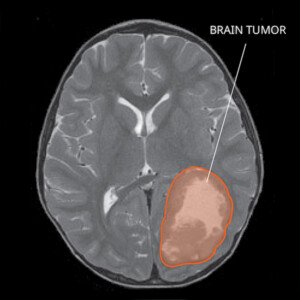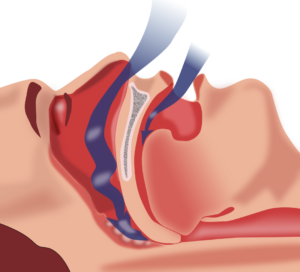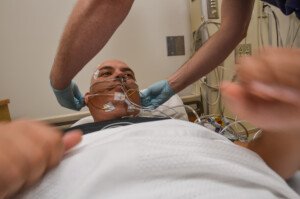
Waking up with morning headaches can mean a brain tumor or sleep apnea.
This is because when headaches are caused by these two conditions, they typically are present as the patient wakes up for the day.
A person may wake with a headache caused by more benign conditions, but this article compares the brain tumor headache to the sleep apnea headache.
Brain Tumor vs. Sleep Apnea Headaches
“Both brain tumors and sleep apnea can be associated with morning headaches,” begins Joseph Krainin, MD, board certified in sleep medicine and neurology and founder of the online sleep apnea clinic Singular Sleep.

“However, it’s important to keep in mind that the mechanism is different,” continues Dr. Krainin.
“Brain tumors take up room inside the skull and create increased pressure. When you lie down, intracranial pressure increases naturally, but, if you’re healthy, you don’t notice it.
“A brain tumor can compound this normal effect and cause a headache.”
A brain tumor also causes fluid buildup overnight that, come morning, can result in a headache.
“Therefore, headaches related to brain tumors are more positional than sleep-related — it’s lying down that sets them off,” says Dr. Krainin.
“Sleep apnea-related headaches are due to the negative physiological consequences of the abnormal breathing events.”
When a person has untreated sleep apnea, their brain (and the rest of the body) is subjected to repeated incidents of subnormal oxygen levels called hypoxic events.
The brain desperately needs oxygen – continuously. Imagine that for eight, even five hours overnight, this supply repeatedly dips – sometimes dozens of times per hour.

Sleep apnea. Habib M’henni, Wikimedia Commons
No wonder many people with untreated sleep apnea awaken to a headache nearly every morning — or even in the middle of the night. It typically lingers for half an hour or so after getting out of bed.
“The classic description of headaches attributable to sleep apnea are low-grade and located posteriorly (back of the head),” says Dr. Krainin.
Tests to Determine if Morning Headaches Are from a Brain Tumor or Sleep Apnea
If a person has symptoms other than regular morning headaches, these will be heavily taken into account.
For example, a brain tumor may also cause nausea, vomiting, increased appetite, unexplained weight loss, clumsiness, problems with gait, one-sided weakness, visual disturbances and cognitive changes.
Daytime symptoms of sleep apnea consist of excessive sleepiness that usually is not remedied with naps, easily dozing off including while driving or at the supper table, a chronic feeling of tiredness or exhaustion, difficulty concentrating or a so-called brain fog, and never feeling refreshed upon waking.
Absence of snoring does not rule out sleep apnea.
Presence of snoring and gasping during sleep does not rule out brain tumor.
Being awakened in the middle of the night at least twice every night by a full bladder is a big red flag for sleep apnea.
If a brain tumor is suspected, an MRI is the diagnostic tool. If sleep apnea is suspected, a lab or home sleep study makes the diagnosis.

Sleep study
In 2013 Dr. Krainin was elected a Fellow of the American Academy of Sleep Medicine, an honor reserved for sleep doctors who’ve made significant contributions to the field in education, research and service.
 Lorra Garrick has been covering medical, fitness and cybersecurity topics for many years, having written thousands of articles for print magazines and websites, including as a ghostwriter. She’s also a former ACE-certified personal trainer.
Lorra Garrick has been covering medical, fitness and cybersecurity topics for many years, having written thousands of articles for print magazines and websites, including as a ghostwriter. She’s also a former ACE-certified personal trainer.
.















